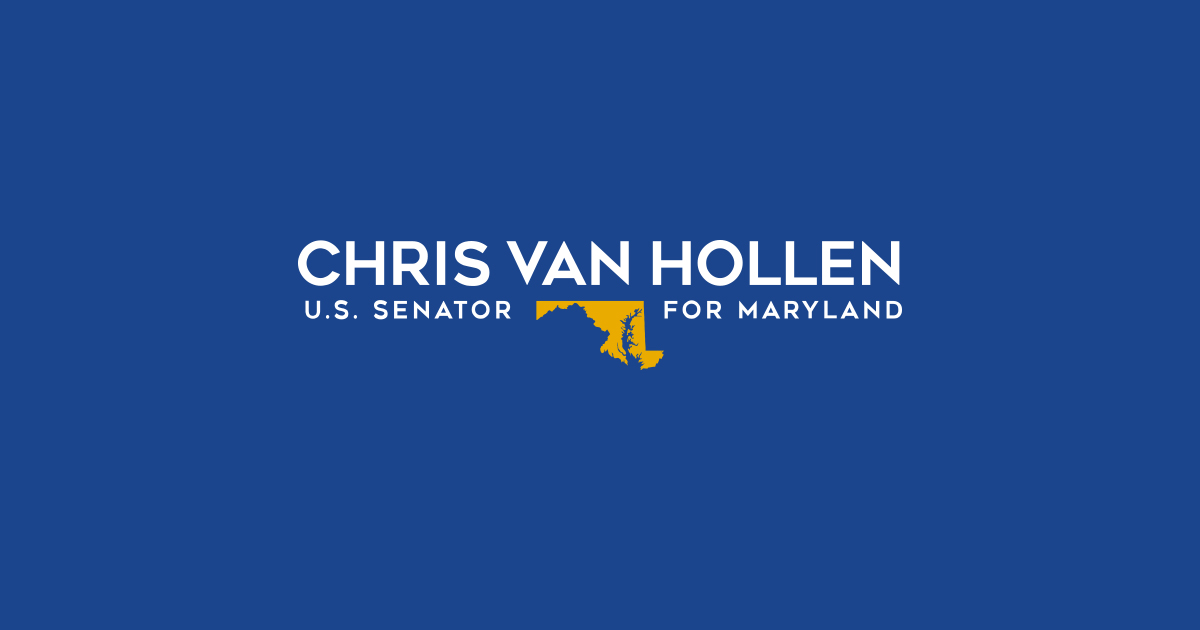Source: United States Senator for Maryland Chris Van Hollen
August 04, 2021
U.S. Senator Chris Van Hollen (D-Md.) applauded the Senate passage of his bipartisan amendment to ensure sound financial footing of public-private partnership projects using Federal Transportation Infrastructure Finance Innovation Act (TIFIA) financing. The amendment was cosponsored by Senators Mike Rounds (R-S.D.), Joni Ernst (R-Iowa), and Mark Kelly (D-Ariz.). This provision was initially included in the bipartisan Promoting Infrastructure by Protecting Our Subcontractors and Taxpayers Act of 2021 authored by Senator Van Hollen. The legislation was also introduced in the House of Representatives by Congressmen Stephen F. Lynch (D-Mass.) and Troy Balderson (R-Ohio). The Senator’s amendment passed by a vote of 97-0.
“Contractor defaults on infrastructure projects can cause costly delays, wasting taxpayer dollars and leaving residents, local stakeholders, and project workers in the lurch. As we work to make historic investments in our nation’s transportation network, we must ensure that projects are financed securely. I’m glad the Senate overwhelmingly passed this bipartisan, common-sense improvement to our nation’s infrastructure financing,” said Senator Van Hollen.
The text of the amendment is available here.
Background:
Van Hollen-Rounds #2354 amends the Transportation Infrastructure Finance Innovation Act (TIFIA) program, which is used to finance P3s, to have the Department of Transportation ensure the design and construction of a project that receive benefits from the TIFIA program have appropriate payment and performance security in place. It is based on legislation Van Hollen and Rounds introduced, the Promoting Infrastructure by Protecting Our Subcontractors Act. The House adopted a bipartisan amendment on this as part of its consideration of the INVEST Act.
The Issue
P3 projects often do not maintain the same level of protection that have been required on public infrastructure projects for over one hundred years through Federal and state Miller Acts. Without these protections, in the event of a contractor default, the project is halted, and can be terminated, leaving subcontractors and workers without pay. Additionally, states and taxpayers then are forced to absorb additional costs of rebidding the project. One example where a private developer defaulted on a P3 project in Indiana left subcontractors without pay and cost the state and taxpayers over $300 million in additional project costs while also causing significant delays on the delivery.
The Solution
Payment and performance protections, through use of surety bonds, provide monetary compensation in case a contractor fails to perform the acts as promised. These bonds play a vital role in ensuring contractors in financial distress avoid bankruptcy allowing subcontractors and workers of public works projects to receive compensation and allowing the project to be delivered within budget and on time. In 2017 and 2018, sureties paid over $1.58 Billion in connection with contractor defaults and “at risk” federal, municipal, and state projects in the U.S., a cost that would otherwise be borne by public government agencies and ultimately taxpayers.
This bipartisan and bicameral policy seeks to provide added protection for our Nation’s workers, subcontractors, and small businesses as they look to solve our country’s infrastructure needs by ensuring essential payment and performance security protections are in place for all forms of project procurement where federal funds are used.
Under this amendment, when considering TIFIA projects the Secretary will determine if a surety bond is required by existing statue (state/local law) and if a determination is made that existing statute (at the state level) doesn’t require it, then the project will be subject to the federal requirement for security.
Supporting organizations
American Subcontractors Association (ASA), National Association of Minority Contractors (NAMC), Women Construction Owners and Executives (WCOE), National Electrical Contractors Association (NECA), Mechanical Contractors Association of America (MCAA), Business Coalition for Fair Competition (BCFC), Finishing Contractors Association (FCA), International, Sheet Metal and Air Conditioning Contractors’ National Association (SMACNA), American Property & Casualty Association of American (APCIA), National Association of Mutual Insurance Companies (NAMIC), The Surety & Fidelity Association of America (SFAA), National Association of Surety Bond Producers (NASBP), Council of Insurance Agents and Brokers (CIAB).
